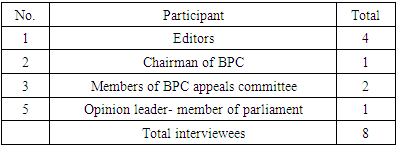-
Paper Information
- Paper Submission
-
Journal Information
- About This Journal
- Editorial Board
- Current Issue
- Archive
- Author Guidelines
- Contact Us
International Journal of Applied Sociology
p-ISSN: 2169-9704 e-ISSN: 2169-9739
2021; 11(1): 21-31
doi:10.5923/j.ijas.20211101.03
Received: Feb. 24, 2021; Accepted: Mar. 24, 2021; Published: Apr. 15, 2021

Effectiveness of Media Regulation in Botswana
1MBA Graduate Class of 2017, Graduate School of Business, Seoul National University, Republic of Korea
2M.Com., MPA (Master of Professional Accounting) Graduate Class of 2009, University of Sydney Business School, Sydney NSW, Australia
Correspondence to: Seunghoon Lee, MBA Graduate Class of 2017, Graduate School of Business, Seoul National University, Republic of Korea.
| Email: |  |
Copyright © 2021 The Author(s). Published by Scientific & Academic Publishing.
This work is licensed under the Creative Commons Attribution International License (CC BY).
http://creativecommons.org/licenses/by/4.0/

Background: Media plays a crucial role in the society. It keeps people well informed about what takes place locally and abroad. For there to be an efficient media system that can stand out to be counted on matters of integrity and accountability, there has to be measures that are put in place to ensure that the regulations are effective and working. Research Objectives: This research has attempted to find how the level of media regulation in Botswana. It specifically talks about the duties of the Media Council and how effective it has been in implementing its functions within the country. The research gives a detailed background about the importance of the media regulation. Methodology: The selected methods of data collection and how data was eventually collected from the targeted group is clearly shown. There is a rich description and an in-depth analysis of the collected data about Media regulation in Botswana. There is also an enhanced discussion that is purely based on the findings of the research regarding media regulation in Botswana. Setting and location: Botswana. Findings and conclusion: It is evident that media plays a crucial role in keeping the society well informed about what goes on both within the country and across the world. However, for there to be a viable media industry, there has to be a positive will from the government. Media freedom can ensure that the players carry out the duties without restrictions and without favoritism.
Keywords: Media regulation, Media self-regulation, Media in Botswana, Social co
Cite this paper: Seunghoon Lee, Effectiveness of Media Regulation in Botswana, International Journal of Applied Sociology, Vol. 11 No. 1, 2021, pp. 21-31. doi: 10.5923/j.ijas.20211101.03.
Article Outline
1. Introduction
- BackgroundSocial communication is vital as media play a major role in informing, entertaining, educating, warning and acting as the forth state in any nation for the public. Laws and regulations set down ensure that these media practices are achieved in the stipulated domain. The respect of the media freedom, in most cases lead to the overall well-being of any society. The powerful nature of the media therefore calls for the need of their accountability to both the public and their professional ethical principles. The existence of the press council is to give confidence to the public that the industry is ready for self-regulation and therefore no need for the state and other stakeholder’s regulations. The emergence of the press council is one of the major vital steps that the freedom of expression is realized from the current established Botswana constitution. This has seen a drastic change on its operation and effectiveness in dealing with media accountability issues in Botswana. There have been concerns raised recently regarding the general effectiveness of media accountability systems in Botswana which led to the probe of this study.Statement of the StudyPress Councils are widely regarded as the most stimulating and most complete mechanisms of media accountability. Media accountability mechanism stimulates the way the press councils widely work. The regulatory bodies work very closely and effectively with the media when they control their activities and overall journalistic practices. In principle, the press councils are considered to be the watchdog of the media while the media themselves serve as the watchdog of the society at large while exposing the rot in both the government and other stakeholders. For the press council to effectively undertake its duties of serving both the public and the media, it therefore needs mechanisms and systems to achieve its goals.Objective of the StudyThe general objective of this study is to examine the effectiveness of media accountability systems in Botswana. The specific objectives of this research are:• To assess the roles of the Botswana Press Council plays as self-regulatory body • To examine the awareness of journalists towards the Botswana Press Council• To identify the major problems for effectiveness of self-regulation of media accountability systems in Botswana Press CouncilSignificance of the StudyThe study is significant in the support of the establishment of effective systems in the Botswana media council hence playing an important role to the country’s journalism in ensuring that self-regulation is adhered to. The research proposes a contribution to the existing body of knowledge by amalgamating existing research about effective press council systems and self-regulations of the media.
2. Literature Review & Theoretical Framework
- History of Media AccountabilityMedia accountability debate is not new. In the USA for instance, a Hutchins commission was set up to investigate some complains concerning the liberality of the media. The 2011 phone hacking by the journalist in the UK created a scene of debates globally on the lack of ethics in reporting (Leveson Inquiry (2012). In the African context, the political development triggered by a sense of democracy, has brought about the investigation of countries such as Nigeria, Ghana, South Africa and Kenya. The discursive of these countries and others in the continent of Africa has been purely linked to ineffectiveness of self-regulation as well as majorly interference to the in the regulation processes (The Media and Democracy Project, 2012). In Africa, political leaders are longing to regulate media and it comes in various forms and guises. According to Akpabio and Mosanako (2018), the leaders would want to ‘sanitize’ the industry to make it more professional by taking the route of intimidation by raiding media houses, seizing copies of publication among other means. The intolerance towards dissent as well as criticism is engraved in African culture should not be encouraged. The truth of the matter is that the ambivalent posture increases the need for self-regulation. It is essential to self-regulate the media before the government moves in to set up press council. For example, South African media is replacing the founding committees with the council that is governed by Ombudsman (Bussiek, 2008). A lot of concerns have been raised regarding the involvement of the government in regulation of the media in Africa. Media Accountability in BotswanaThe research on Media Accountability dates back to Botswana’s history with its colonial founder the British where majority of the practices and constitution have been aligned together. For instance, government, politics and the media have not had a smooth relationship since time memorial, and it was only after a period of time that some practices were regulated and freedoms allowed. According to Akpabio and Seamogano (2018), since the public media are fully owned by government, the private, media are most affected when dealing with collision between Government and the press. According to Fombad and Tachilisa (2016), media in Botswana is categorized into four, the print media, press laws, broadcast media and news agencies. The print media is almost fully private owned and operates with zero government restricts. On the other hand, the broadcast media is regulated and government controlled and very much abused by government officials who are in charge (Fombad, & Tachilisa, 2018).In 2015, Journalism and media practice in Botswana was under siege with the government misusing state facilities to frustrate journalists. The media was sued and taken to court on several occasions for doing what they are required by the law, but against the government dictation. The roles of the media and journalism practice are wide, with the main ones being a watchdog to the society through documenting what happens in the fairest and professional way. Ideally, the media informs the world at large on the happenings and educates the people (Muneri, 2018). These were some of the freedoms that were really abused in 2015 by the reigning government. In March 2015, the legislatures of Botswana rejected a bill that outlines the freedom of information after being introduced to parliament. This was a way of gagging the media and preventing it from making publications that tarnish the government and state corporations. Following the ban, later in May three journalists were arrested and arraigned in court on the offences of unlawfully disclosing information that linked government officials to illegal deals of oil and government (Jotia, 2018). Media Regulations in BotswanaMedia regulations refer to the policies and principles that are enacted by the government together with media professionals that provide directions to the media industry. The policies set parameters as well as guidelines through which media operates. Media regulations in Botswana are classified as a code of ethics where media people are to follow and adhere to for good practice. It is essential to note that there is no formal document that exists on broadcasting in Botswana. However, there are statutory instruments, for instant acts and regulations. These instruments are the main guiding frameworks. They include the repealed Broadcasting Act (1998), Broadcasting Regulations (2004) and Botswana Communication Regulatory Acts (2012). In addition to the above acts, there are actions and decisions that are arrived at by the government that provide guidance to the operation of media in the country. They include directive on coverage of media activities and coverage on elections and government activities. Journalists are protected by the Botswana Media Council, a union that advocates for justice and prevents harassment of journalists (Frederickson & Walling, 2019).Media Self-Regulation in BotswanaThe press council in Botswana enjoys press recognition. The council is represented in the highest advisory structure of the central government. According to Akpabio and Mosanako (2018), the only question is how far the embrace should go. There are guidelines for lodging complaints which are clearly outlined by the committee. There is also an Appeals’ committee that is mandated with the responsibility of hearing appeals. Membership of both committees is open to persons to even persons who are not media professionals to ensure that there is fairness and transparency in the disposal of cases (Bussiek, 2008). The concept of Media Self-RegulationSelf-regulation is about setting reduced standards on ethics so that journalists or media people are able to attain the highest professional standards to help them conduct the work credibly and be accountable for it (Livingstone, 2012). Only reputable media and media outlets are trusted and gain favor of the public. This means that consistency and credibility are very essential in achieving this goal. When the media serves its right purpose of being a watchdog to the society and reporting news without fear, favor or prejudice, they gain the trust of people and society at large hence is able to be approached for more unearthing of societal rots. According to Dunne (2017), a responsible media is able to move through and navigate between the government and the general public and thus able to make its rightful demands (Alsius, 2010). The media, and journalism practice at large is an act of social responsibility and details certain risks and harshness. However, it is a pledge to endure all the happening and be able to document and give reliable, authentic and credible information. Press Councils and media accountabilityMedia accountability is widely backed up by Press Councils as they are regarded the mechanisms that complete it. Media industry operates effectively with the aid of other relevant tools that make their work easier. First, the public is the most important tool in media as it is the consumer and the source of information. In a society where the public is vigilant and well equipped, media has an easier work to unearth societal rots and unmask evil. Additionally, the public help in determining what is good and what is not. What is criticized is part of feedback and this is very relevant in meeting the goals and set standards (Livingstone, 2012). The involvement of members of the public in these organisms is especially meaningful; because, on the one hand, it forces media shun away the temptations of groups and individuals that are more interested in protecting their interests and doing everything to ensure their selfish goals are attained (Asal, 2016). Primarily, the Press Councils are formulated to receive complaints from different people or groups of people who feel offended directly or indirectly Media behavior is not constant and what might serve a person today might not necessarily serve the other person the next time. Therefore, the legal grounds are established by the press councils or media councils depending with the state that one comes from as well as the rules that govern that state (Alsius, 2010). Judgment is expected and very common just as backlash that can be experienced after a story of documentary is published and information consumed by the public. Defamation and lawsuits are common terms in the media since it details accounts of very many people, each with their own substantial understanding and interpretation (Bertrand, 2003). The press councils therefore limit these and ensure sobriety is upheld. It thus takes the responsibility of dealing with questions that address issues where ethical responsibilities are at stake (which are rather different from legal responsibilities, covered by law and materially sanctioned by the courts). They also play the role of mediator in that they engage different groups of people through sober communication hence limiting conflict and solving arising issues in a fair and amicable manner. It is thus basically a building bridges tool that connects the three prospects of media, consumers and producers (Alsius, 2010).Portuguese Experience of Press Council (1975-1990)Between 1975 and 1990, Portugal had already a press council which was formed immediately after the end of political dictatorship. Democracy and Press freedom came into being through a peaceful revolution that was spearheaded by the military on April 25th 1974. The rights of the citizens were to be heard and be provided with the best solutions whenever it was required. The existence of Press Council in countries like Australia, Germany and the UK inspired the legislators. However, they came up a fairly different model that was specifically inclined to the characteristics of the country during the time. The Council was presided over by a judge and was made up of representatives from media management as well as journalists. There was also one worker from the newspaper industry and four members who were elected by the country’s parliament. It is essential to note that there was no direct or indirect involvement of the central government (Mogalakwe & Nyamnjoh, 2017).Breaching of Media Accountability in BotswanaBotswana media started aggravating in 2015, with the government infringing on the media houses, taking charge and controlling some of the biggest media houses as well as threatening journalists and media personalities. The concept of media accountability is highly breached in Botswana by the state. For instance, the government has tried in every way to sabotage the efforts by Botswana Communications Regulations Authority (BOCRA) through delaying their processes and applying stringent regulations for it to operate and be effective. According to Fombad (2018), politics form a major part of the Botswana media, with the ruling party handling all broadcast media and barring other parties from using the media to advocate for justice or address their supporters. Up-to-date, a journalist in Botswana is at more risk of being sued, threatened or even killed for going against the ruling party or failing to adhere to the favors that the politicians want. Therefore, media in Botswana has been sabotaged by the ruling party which is the state, hence preventing progressive running and documenting of events. The media houses breach the accountability by failing to protect their employees and failure to guarantee their safety for instance, very few media houses in Botswana if not none, have legal practitioners to protect them and their staff against lawsuits and injustices. There are very many cases reported of journalists who have been assaulted and even arrested with the media houses they work for. Ideally, the media houses have breached accountability through remaining quiet and overlooking all the injustices in the country. A journalist has a mandate to report all actions of the society and make it out in the open despite the amount of threats leveled against them. However, this is not the case as many media houses in Botswana have been cowed into hiding the truth and failing to report the actions of corruption, injustices and abuse of human rights. Being a media person is like taking an oath, with ethics and regulations expected to be followed to the latter, despite the situation that somebody is in. The issue of corruption and the phrase commonly referred as the brown envelope has taken over the media house. According to Akpabio (2018), this is where a journalist or media house is paid to not disclose sensitive information at the interests of a powerful person. For example, a story regarding high end corruption or groups of cartels may fail to be documented in the media after powerful people pay huge sums of money. This is a breach of accountability that needs to be stopped and made punishable before it encumbers the whole nations and renders everything paralyzed.Systems and AccountabilityThe theory of social responsibility in the sense of Hutchins and Four Theories of the Press is not the whole explanation of how the concept of media accountability has developed. The picture is filled out with the help of comparative studies of media systems and how they relate to different political systems (Hallin & Mancini 2004). Hallin and Mancini take their point of departure in Siebert, Peterson and Schramm’s four theories and the question, why the press is as it is, taking different forms in different countries, but they soon take a totally different approach to answering the question. Botswana Media Legal FrameworkFreedom of press and publishing information is respected in Botswana although there are no legal frameworks that advocate for the same. The constitution does not specifically outline the press freedoms that are offered in Botswana, hence very hard to legally battle a court order or case that details media gagging. Media houses and journalists are continuously harassed through court orders and being sued for doing what is required in their line of work. For example, in the case of the Mmegi Newspaper which was cyber attacked and all the work they had achieved for 12 years distorted, there were no laws governing neither them nor a path to be followed where justice would be served (Hughes, 2017). Therefore, the Botswana constitution although well formulated to govern its people and ensure democracy is served has zero legal representation measures to protect and govern journalists and the media at large at their place of work.Botswana Political and Economic EnvironmentThe political and economic environments of Botswana are quite favorable to the media, although a few challenges have been experienced. The state publications have mainly been recognized to favor the government and critic the oppositions while the private owned have been known to critically be fair in their publications. However, there have been certain cases where the opposition accused some of the private owned independent media of favoring government and operating under false pretense after being bought. The political environment rarely affects the Media accountability as very few cases of assault have been reported between 2012 and 2019. The economic environment gives a wider provision to the state owned media in that inadequate provisions have been instituted to manage the oppositions. Media, both private and government owned play a big role in the state’s economy through provision of employment and revenues. The private media for instance, gives a huge percentage via tax to the economy hence boosting the county’s agendas (Dijck, Poell & Waal, 2018). At the same time, thousands of people have secured employment especially in the private sector, creating stability and improving the livelihood of people in the country. Learning institutions such as universities and colleges have also embraced the media studies and have provisions aimed to boost the study as a whole. The media is highly dependable in advertising, with an incident in 2015 barring Government departments from publishing with Private owned media. According to Mmegi Newspaper, the move affected private media organizations highly and even reduced their annual profits collected as government adverts were well paying and sponsored. However, the government gave its statement terming it as a cost cutting measure aimed to slash and reduce government expenditure (Maundeni & Zibani, 2017: 9). Application of Code EthicsThe practical application is mandated for media owners, publishers, learning institutions and the media practitioners enforced by the Press Council of Botswana. The Press Council of Botswana (PCB) regulates and facilitates easy flow of activities in the media by offering protection to both the media people and the general people who have a right to be fed or receive the right accurate information (Botlhale, 2016). Requirements for the media standards include professionalism and observing the required ethical standards. For instance, the right and accurate information are the only forms of news to be distributed to the public. This is made possible through hiring professionals in each field to suit the type of position. Students who study Journalism in colleges or Universities are considered learners in the practice. However, the total qualifications involve a certificate, diploma, degree, masters or PhD in the field from a recognized University or college. Botlhale (2016) points out that when it comes to the practice, one is expected to be licensed and registered by the Botswana Press Council hence allowing for full practice and enjoying the protection of practitioners provided by the act. According to Good (2017), it is easier to file complaints and get represented or protected from assault or threats as a media person when one is fully registered under the Press Council of Botswana (Good, 2017).Right of Reply or CommentThe act outlines that an individual holds the right to reply or clarify information that they feel wasn’t published correctly. Just as the media people are allowed to inquire and go in depths to find the relevant information, the person questioned or being investigated also holds the right of reply. However, the act limits the person investigating the story from making any commentaries relating to the story being carried or investigated. One is supposed to remain neutral and refrain from picking sides or being viewed to lean on one side. Emotions should never be used to sway or cloud judgment of the story or information being perused. Matters regarding public interests such as corruption or murder are required by the act to be documented without prejudice. For instance, if a government corporation or multi agency issues threats regarding publication of certain information or documents, the public is obliged to know and aware of the level of pressure. Elections are the most testing moments of democracy in any state (Sebudubudu, 2017). This applies universally as even in most developed countries, coverage of elections by the media breaks or makes their stand on democracy. In Botswana, elections have been peaceful and only encumbered by challenges that are unavoidable or can be managed (Maundeni, Masilo, & Patience, 2017). The media has played a very critical role in this by how they reported the occurrence of events. For any instance that violence is anticipated, things get ugly and bloodshed. However, whenever it is reported professionally and challenges addressed, the flow is often applauded and very fast. Privacy, Brown Envelope and Children CasesThe Press Council of Botswana limits publications that infringe on children rights. No matter the case or information being carried out, children are expected to be protected and kept away from the media as any expose might be damaging to their lives and mental health. The media does not include names of minors or their images when giving information regarding crimes or assault (Jankey, Ngwenya, & Refilwe, 2017). According to the International Encyclopedia of International Communication, children are protected across the globe from any news coverage that might interfere with their upbringing. This is done through hiding their identities of names, blurring the face or hiding the image (Sebudubudu, 2017). Therefore, no matter how much information has been availed, children privacy and protection comes first and is necessitated as part of the ethics of media practice (Moahi, 2016). Botswana Media Practitioners’ ActMakgala and Botlhomilwe (2017) note that the Botswana Media Practitioners Act was passed in December 2008 by the government despite the efforts to stage protests and demonstrate against its introduction. The act was passed and initiated to control and preserve media freedom, uphold standards of professional journalism, to uphold media ethics and practice and finally to create public awareness on the rights and responsibilities that media people are mandated to carry. Petronio (2015), points out that this act was constituted of a committee with different representations from relevant stakeholders. They included legal representation from the law society, a person representing the public hence public interest, a member from the media houses and one from state agency. It withdrew many practices that were common in the media before then, deregistering unqualified and unprofessional journalists. Although the media was limited after introduction of the act, Journalism practice was restored and accuracy in acting as watchdog advanced (Makgala, & Botlhomilwe, 2017).According to Lundin (2018), in reference to the Botswana Gazette, Journalism in Botswana is dominated by government and state agencies more so the broadcast and print. This has hindered the progression of journalism as a whole and prevented certain journalists and media houses from doing their work. For example, competition has been stiffed by the government pouring state machinery into the Government owned media hence posing as tough competition to other news agencies (Lundin, 2018). The Daily News is a newspaper published by the state and it is free, being distributed across the parts of the country. This move affects the private owned media since they incur the cost of printing and collecting information only to be faced by a competitor who makes free distributions. According to the research, the independent private owned media has failed to pick up and succeed with the resources channeled due to strict regulations and competition (Sebudubudu, 2017).
3. Methodology
- This study employed a mixed method approach using both qualitative and quantitative methods. This method was preferred since it systematically integrates quantitative and qualitative data within a distinct study. The method permits a more complete and synergistically use of data than separating quantitative and qualitative data collection and analysis. Using this premise, the both types of data was collected at the same time and jointly displayed. This ensured the provision of validity and creates a concrete premise for development of conclusion. It also allowed for the rich field in combination of data with both words and figures to add meaning to the interpretation of numbers (Nagy &Biber, 2010, pp. 4–15). In qualitative, case study was used while utilizing in-depth interviews as data collection while in quantitative, survey techniques was adopted to answer study questionnaires.Case studyA multiple case study method was adopted to study Botswana Press Council. This is an in-depth investigation of a particular case in a real-life situation. As cited by Mills, Wiebe, Durepos & Weatherbee (2010), case study is useful when studying individuals or grouping in their natural set up. Several researchers have used the multiple case studies to conduct such kind of research in media houses. They are frequently undertaken to provide examples of good practice in the delivery of a specific policy or programme, or they may be undertaken as part of an evaluation project, providing examples of the impact of a policy.” Since I intended to study Botswana Press Council relevant policies in regards to media accountability, they were be evaluated in case by case basis. The council was studied in its natural set up hence the need to adapt the case study method. First hand data from these cases were collected from interviews while secondary data were collected from books, articles, government policies as well as news pieces (Munce & Onwuegbuzie, 2019).In-depth interviewInterviews are a strategy of asking questions to seek for more concrete information in a particular subject (Gill et al., 2008). The interviews were determined by the researcher in the topics that was covered. The semi-structured interview was used to generate incomparable answers from each of the respondents that participated in the study. Semi-structured interviews consist of several key questions that helped to define the areas to be explored, but also allows the interviewer or interviewee to diverge in order to pursue an idea or response in more detail (Gill et al., 2008). This method was selected because of its effectiveness in obtaining in-depth first-hand information on concepts, perceptions and ideas of a participant. Therefore, a scheduled skype interview was conducted with the study participants from the sampled media houses in Botswana to make this study more credible. SurveyAccording to Singh (2007, p.86), a survey is a research method that is used to gather data from study participants that are representative of a population. Instruments are developed and constructed which include closed and open-ended questions to collect this data from the field. A questionnaire made up of three sections was developed to collect information from the respondents. This included both the objective and multiple response questions. Using Kobotool box an online form, the self-administered questionnaires were sent to the respondents through their email addresses as well as their WhatsApp group to allow them fill out by themselves.SamplingSampling is the technique in selecting participants or objects that will be studied in a research. In qualitative study there are typically other considerations, and the sample size for an interview depends on the aims of what is the data expected in terms of answering a question.
|
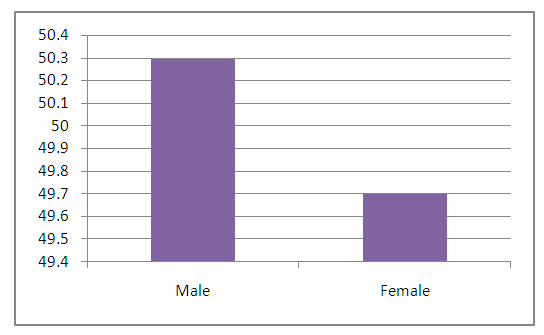 | Figure 1. Gender representation |
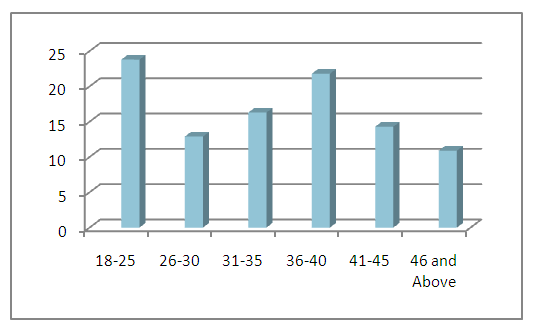 | Figure 2. Level of qualification |
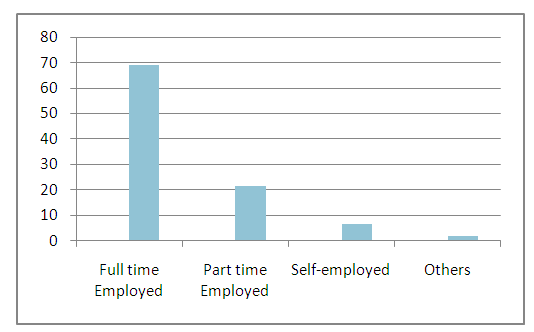 | Figure 3. Current employment status |
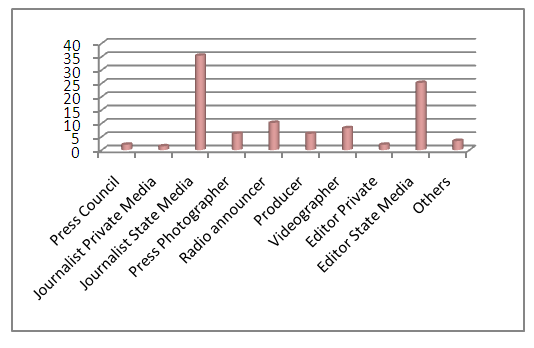 | Figure 4. Current work |
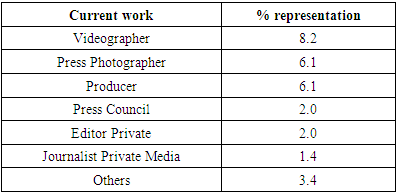 Related work areaThe work curried out by most interviews are closely related and based on the number of people interviewed, they represented 59.9% compared to 38.1% who performed unrelated jobs.
Related work areaThe work curried out by most interviews are closely related and based on the number of people interviewed, they represented 59.9% compared to 38.1% who performed unrelated jobs. 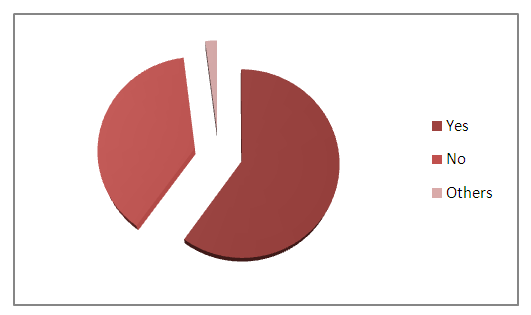 | Figure 5. Related work area |
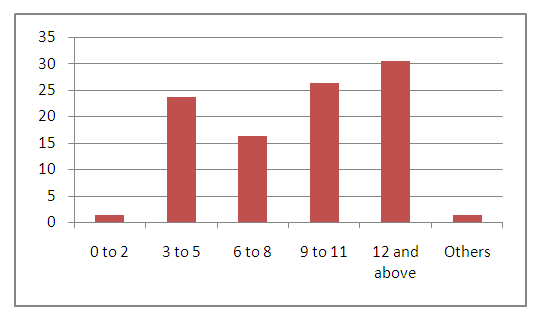 | Figure 6. Work tenure |
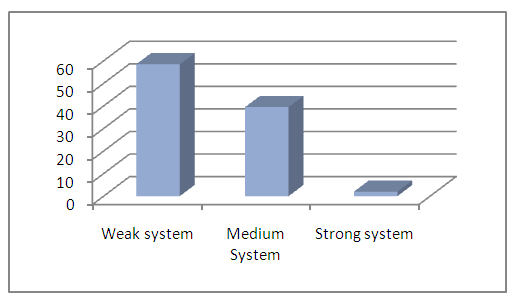 | Figure 7. Media regulation in Botswana |
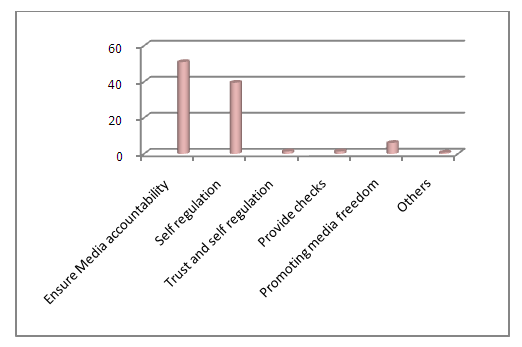 | Figure 8. The role of Botswana Press Council |
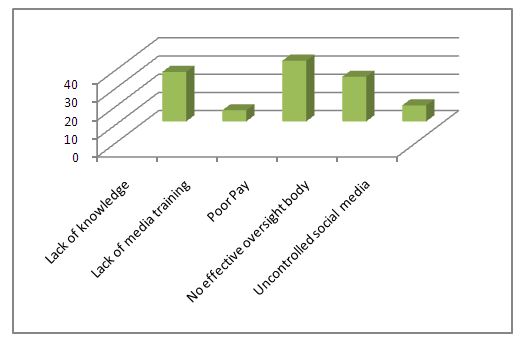 | Figure 9. Major Causes of Unethical Journalism in Botswana |
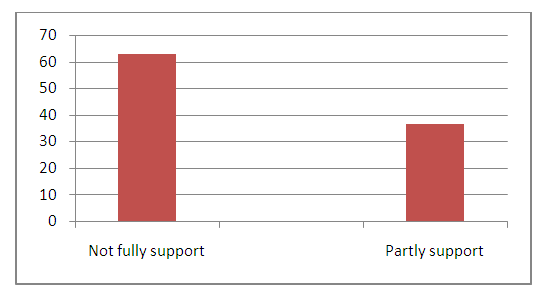 | Figure 10. Government support of Botswana Press Council |
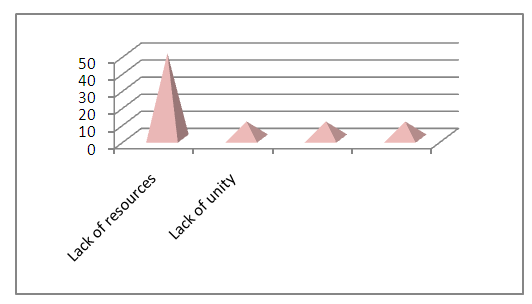 | Figure 11. Major issues that affect the performance of BPC |
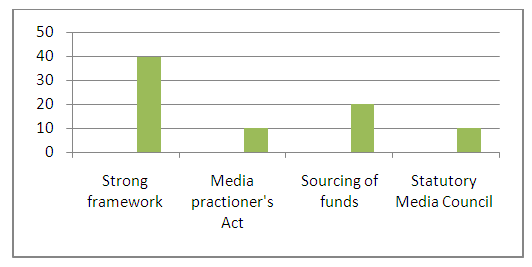 | Figure 12. Suggestions to overcome the major issues that affect the performance of BPC |
4. Discussion
- According to the results obtained from the research it is evident that media regulation in Botswana is very weak and the problems originated from the previous government regime. As pointed out by Balule (2016), media still operates in a policy vacuum because national media policy does not exist neither is a broadcasting policy. The government did very little to protect and maintain the institutions that were created for media accountably. The policy framework that were created to hold the media accountable were disregarded by the people in charge. When the press council was started, it was after the realization that the public was very unhappy with the media and they wanted the media to be held accountable either way. Self-regulation was therefore, the way to go. This is supported by Kluwer (2018) who says, self-regulation was an instance where the media would regulate itself. That was the most preferable after evaluating different systems. Media could not be regulated by government or any structure that was ultimately controlled or accountable to government. The original plan was very clear; to allow the media fraternity, like other professions, the ability to manage themselves and handle issues related to the operation of the media. However, the industry was hijacked by the enemies of progress who had no idea about media industry but wanted to be part and parcel of the implementation process.
5. Recommendations and Conclusions
- RecommendationsThe press council is an organization that has been set up by the media itself. It is therefore imperative that the number one source of funding has to come from the players in the media industry. They have to be there, they have to step up and assist because this is their organization and obviously we know that even the media organizations themselves find it difficult to keep themselves afloat because business is dynamic. Members should comply and pay subscriptions to the Press Council and respect decisions of the Press Council to make it relevant to the society and potential donors. It is understandable that the media also has to fund themselves before they start funding other entities. Funding the council becomes difficult because they are also struggling to stay afloat. But in principle the first source of funding really should be the media practitioners themselves. It is also essential that the media council gets out and approach private organizations and go beyond the borders of Botswana to look at international organization that can assist with funding. With adequate funding, the media industry will tremendously grow. More research need to be carried out to establish better ways of improving the state of media industry not just in Botswana but African continent and the world in general. ConclusionIt is evident that media plays a crucial role in the current society. Media keeps the society well informed about what goes on both within the country and across the world. It is therefore essential to put in place measures that will ensure the media industry is always at its best. Policies need to be formulated to help control and strengthen the media industry. It is evident that for there to be a viable media industry, there has to be a positive will from the government. Through an act of parliament, the media industry can strengthen the functions of the press council to enable then implement their duties accordingly. Media freedom ensures that the players are able to carry out the duties without restrictions and without favoritism. A well respected media freedom can lead to the overall wellbeing of the society. Collaborations of all the stakeholders will ensure that the initial objectives of creating strong and trusted media industry are attained. The expected findings for future research will conceivably give clear directions on the growth of strong and credible media industry.
 Abstract
Abstract Reference
Reference Full-Text PDF
Full-Text PDF Full-text HTML
Full-text HTML